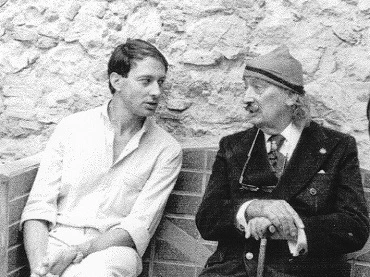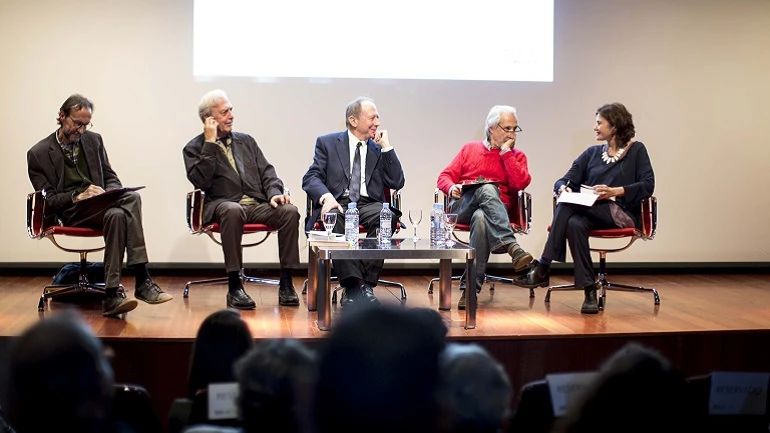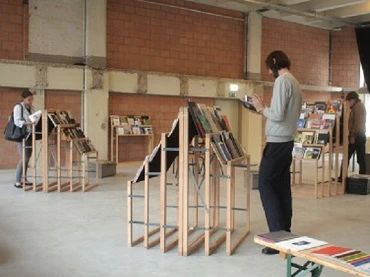Documentos 1. Art, Words and Memory in the Texts of Gómez de Liaño

Ignacio Gómez de Liaño and Salvador Dalí in the Empordà artist’s house in Portlligat, September 12, 1978
Held on 13 Oct 2016
The programme Documentos, which revolves around themes related to the Museo Reina Sofía Documentation Centre, presents its first activity: Art, Words and Memory in the Texts of Gómez de Liaño, a round-table discussion which looks at the output of Ignacio Gómez de Liaño.
Since the 1960s, Ignacio Gómez de Liaño has written numerous texts on an array of contemporary artists, with his work reflecting the diversity of the trends and styles that distinguish these creators’ output. Equally, this quality responds to the eclectic spirit and multi-faceted personality of the author himself: a philosopher, historian, narrator, poet, translator...
In his writings, which have recently come to the fore in the collection entitled Libro de los artistas (The Book of Artists, Ediciones Asimétricas, 2016), critical analysis, sentimental memory and literary volition converge, as does a decisive premise that safeguards the unity of the whole: the friendship he maintained with each artist to which he dedicated his biographical sketches and essays. This circumstance implies not only direct knowledge of the works but also the living context, enabling him to orbit the surface of the artistic activity in order to examine the relationship between the visible and the utterable: “There is nothing like looking at the deed to know what the words mean”.
This round-table discussion features the participation of Alain Arias-Misson, Selina Blasco, Ignacio Gómez de Liaño and José María Parreño, and is moderated by José Luis Gallero.
Participants
Alain Arias-Misson (Brussels, 1936) is an artist, novelist and essayist. Born to an English mother and a Belgian father, he grew up and studied in New York. He earned a degree in Greek and French Literature from Harvard University, and, in the 1960s, was a pioneer of the experimental poetry movement in Spain, along with Joan Brossa, Herminio Molero and Ignacio Gómez de Liaño. He invented “public poems”, which he created from 1967 in Brussels – and in Madrid in 1969 – citing them as a way for him to “write on the page of the street”. His works have been displayed in numerous exhibitions and have been published in anthologies in Europe, the USA, South America and Japan.
Selina Blasco (Madrid, 1959) has a PhD in Art History from the Complutense University of Madrid and is a professor of Art Theory and History at the same university’s Faculty of Fine Arts. Since writing her dissertation La fundación del Escorial de fray José de Sigüenza (The Foundation of the El Escorial of Brother José de Sigüenza), she has specialised in literary art and texts on art and architecture, as well as the more general field of the relationship between text and image. Her recent publications include: Mariano Fortuny: la casa y la tela (Mariano Fortuny: House and Cloth, 2013) and Mantener las formas. La academia en y desde las prácticas artísticas (Maintaining Forms. The Academy in and from Artistic Practices, 2013).
José Luis Gallero (Barcelona, 1954) is an editor, art critic and exhibition curator. Among other works, he has published Solo se vive una vez: esplendor y ruina de la movida madrileña (You Only Live Once: Splendour and Ruin in the Madrid Movida Movement, 1991) and Heráclito: Fragmentos e interpretaciones (Heraclitus: Fragments and Interpretations, 2009). Furthermore, he has worked on preparing the editions of critical text collections on Quico Rivas, Cómo escribir de pintura sin que se note (How to Write About Painting Inconspicuously, 2011) and Ignacio Gómez de Liaño, Libro de los artistas (The Book of Artists, 2016).
Ignacio Gómez de Liaño (Madrid, 1946) is a writer, philosopher and professor of Aesthetics. He has lectured at the Advanced School of Architecture, Madrid, the Faculty of Political Science and the Faculty of Philosophy at the Complutense University of Madrid, as well as universities in Osaka and Beijing. He is a regular contributor in numerous media, and the author of works that span from poetry and theatre to art, philosophy and personal journals. His noteworthy publications include Athanasius Kircher: Itinerario del éxtasis o las imágenes de un saber universal (Athanasius Kircher: Itinerary of Ecstasy or the Images of Universal Knowledge, 1986), Iluminaciones filosóficas (Philosophical Illuminations, 2001), Sobre el fundamento (On the Foundation, 2002), En la red del tiempo. 1972 1977 (In the Network of Time, 1972-1977, 2013) and Libro de los artistas (The Book of Artists, 2016), his most recent work.
José María Parreño (Madrid, 1958) is a professor in the Faculty of Fine Arts at the Complutense University of Madrid. He was previously deputy director of the Museo de Arte Contemporáneo Esteban Vicente, Segovia, from 1998 to 2004, and director between 2004 and 2007. He is also an art critic and exhibition curator and has published a dozen books of essays and poetry, the most recent of which include Arte y Ecología (Art and Ecology, 2014) and Pornografía para insectos (Pornography for Insects, 2015).


Más actividades

Aesthetics of Peace and Desertion Tactics
8 October 2025 – 24 June 2026
The study group Aesthetics of Peace and Tactics of Desertion: Prefiguring New Pacifisms and Forms of Transitional Justice proposes a rethinking—through both a theoretical-critical and historical-artistic lens—of the intricate network of concepts and practices operating under the notion of pacifism. A term not without contestation and critical tension, pacifism gathers under its name a multiplicity of practices—from anti-militarism and anti-war movements to non-violence activism—while simultaneously opening urgent debates around violence, justice, reparation, and desertion. Here, pacifism is not conceived as a moral doctrine, but as an active form of ethical and political resistance capable of generating aesthetic languages and new positions of social imagination.
Through collective study, the group seeks to update critical debates surrounding the use of violence and non-violence, as well as to explore the conflict of their representation at the core of visual cultures. In a present marked by rearmament, war, genocide, and the collapse of the social contract, this group aims to equip itself with tools to, on one hand, map genealogies and aesthetics of peace—within and beyond the Spanish context—and, on the other, analyze strategies of pacification that have served to neutralize the critical power of peace struggles. Transitional and anti-punitive justice proposals will also be addressed, alongside their intersections with artistic, visual, and cinematic practices. This includes examining historical examples of tribunals and paralegal activisms initiated by artists, and projects where gestures, imaginaries, and vocabularies tied to justice, reparation, memory, and mourning are developed.
It is also crucial to note that the study programme is grounded in ongoing reflection around tactics and concepts drawn, among others, from contemporary and radical Black thought—such as flight, exodus, abolitionism, desertion, and refusal. In other words, strategies and ideas that articulate ways of withdrawing from the mandates of institutions or violent paradigms that must be abandoned or dismantled. From feminist, internationalist, and decolonial perspectives, these concepts have nourished cultural coalitions and positions whose recovery today is urgent in order to prefigure a new pacifism: generative, transformative, and radical.
Aesthetics of Peace and Tactics of Desertion, developed and led by the Museo Reina Sofía’s Studies Management, unfolds through biweekly sessions from October to June. These sessions alternate between theoretical discussions, screenings, work with artworks and archival materials from the Museo’s Collection, reading workshops, and public sessions. The group is structured around sustained methodologies of study, close reading, and collective discussion of thinkers such as Judith Butler, Elsa Dorlin, Juan Albarrán, Rita Segato, Sven Lütticken, Ruth Wilson Gilmore, and Franco “Bifo” Berardi; historical episodes such as the anti-nuclear and anti-arms race movement in Spain; and the work of artists and activists including Rojava Film Commune, Manuel Correa and the Oficina de Investigación Documental (Office for Documentary Investigation), and Jonas Staal, among other initial cases that will expand as the group progresses.

Institutional Decentralisation
Thursday, 21 May 2026 – 5:30pm
This series is organised by equipoMotor, a group of teenagers, young people and older people who have participated in the Museo Reina Sofía’s previous community education projects, and is structured around four themed blocks that pivot on the monstrous.
This fourth and final session centres on films that take the museum away from its axis and make it gaze from the edges. Pieces that work with that which is normally left out: peripheral territories, unpolished aesthetics, clumsy gestures full of intent. Instead of possessing an institutional lustre, here they are rough, precarious and strange in appearance, legitimate forms of making and showing culture. The idea is to think about what happens when central authority is displaced, when the ugly and the uncomfortable are not hidden, when they are recognised as part of the commons. Film that does not seek to be to one’s liking, but to open space and allow other ways of seeing and inhabiting the museum to enter stage.

Intergenerationality
Thursday, 9 April 2026 – 5:30pm
This series is organised by equipoMotor, a group of teenagers, young people and older people who have participated in the Museo Reina Sofía’s previous community education projects, and is structured around four themed blocks that pivot on the monstrous.
The third session gazes at film as a place from which to dismantle the idea of one sole history and one sole time. From a decolonial and queer perspective, it explores films which break the straight line of past-present-future, which mix memories, slow progress and leave space for rhythms which customarily make no room for official accounts. Here the images open cracks through which bodies, voices and affects appear, disrupting archive and questioning who narrates, and from where and for whom. The proposal is at once simple and ambitious: use film to imagine other modes of remembering, belonging and projecting futures we have not yet been able to live.

Remedios Zafra
Thursday March 19, 2026 - 19:00 h
The José Luis Brea Chair, dedicated to reflecting on the image and the epistemology of visuality in contemporary culture, opens its program with an inaugural lecture by essayist and thinker Remedios Zafra.
“That the contemporary antifeminist upsurge is constructed as an anti-intellectual drive is no coincidence; the two feed into one another. To advance a reactionary discourse that defends inequality, it is necessary to challenge gender studies and gender-equality policies, but also to devalue the very foundations of knowledge in which these have been most intensely developed over recent decades—while also undermining their institutional support: universities, art and research centers, and academic culture.
Feminism has been deeply linked to the affirmation of the most committed humanist thought. Periods of enlightenment and moments of transition toward more just social forms—sustained by education—have been when feminist demands have emerged most strongly. Awareness and achievements in equality increase when education plays a leading social role; thus, devaluing intellectual work also contributes to harming feminism, and vice versa, insofar as the bond between knowledge and feminism is not only conceptual and historical, but also intimate and political.
Today, antifeminism is used globally as the symbolic adhesive of far-right movements, in parallel with the devaluation of forms of knowledge emerging from the university and from science—mistreated by hoaxes and disinformation on social networks and through the spectacularization of life mediated by screens. These are consequences bound up with the primacy of a scopic value that for some time has been denigrating thought and positioning what is most seen as what is most valuable within the normalized mediation of technology. This inertia coexists with techno-libertarian proclamations that reactivate a patriarchy that uses the resentment of many men as a seductive and cohesive force to preserve and inflame privileges in the new world as techno-scenario.
This lecture will address this epochal context, delving into the synchronicity of these upsurges through an additional parallel between forms of patriarchal domination and techno-labor domination. A parallel in which feminism and intellectual work are both being harmed, while also sending signals that in both lie emancipatory responses to today’s reactionary turns and the neutralization of critique. This consonance would also speak to how the perverse patriarchal basis that turns women into sustainers of their own subordination finds its equivalent in the encouraged self-exploitation of cultural workers; in the legitimation of affective capital and symbolic capital as sufficient forms of payment; in the blurring of boundaries between life and work and in domestic isolation; or in the pressure to please and comply as an extended patriarchal form—today linked to the feigned enthusiasm of precarious workers, but also to technological adulation. In response to possible resistance and intellectual action, patriarchy has associated feminists with a future foretold as unhappy for them, equating “thought and consciousness” with unhappiness—where these have in fact been (and continue to be) levers of autonomy and emancipation.”
— Remedios Zafra

27th Contemporary Art Conservation Conference
Wednesday, 4, and Thursday, 5 March 2026
The 27th Contemporary Art Conservation Conference, organised by the Museo Reina Sofía’s Department of Conservation and Restoration, with the sponsorship of the Mapfre Foundation, is held on 4 and 5 March 2026. This international encounter sets out to share and debate experience and research, open new channels of study and reflect on conservation and the professional practice of restorers.
This edition will be held with in-person and online attendance formats, occurring simultaneously, via twenty-minute interventions followed by a five-minute Q&A.
